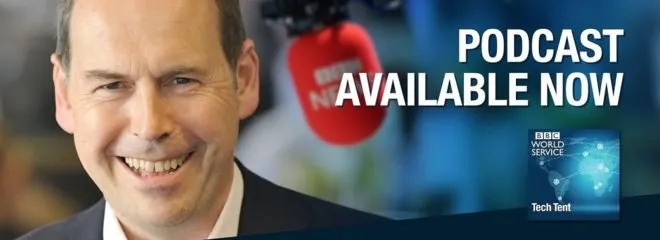
Stream or download the latest Tech Tent podcast
Listen to previous episodes on the BBC website
Listen live every Friday at 15:00 BST on the BBC World Service
Could a country issue its own crypto-currency such as bitcoin? Or would that be defeating the point of a form of money that is supposed to be free from government control?
On my Tech Tent podcast this week, we hear about estcoins, a currency that could be launched in Estonia. We also discuss Samsung's new flagship phone and meet the young people who are hacking with hydrogen fuel cells.
Estonia's estcoin experiment
Excitement around the idea of crypto-currencies, which exist online and are not controlled by any central bank or government, reached new heights this week as the value of bitcoin soared above $4,000 (£3,100).
Now, in what might seem an eccentric move, a government wants to get in on the act. Estonia, a country that prides itself on being at the cutting edge of digital technology, is floating the idea of a currency called estcoins.
This would be linked to its successful e-residency scheme that gives foreigners wanting to start businesses in Estonia a digital identity. This has been so successful that Kaspar Korjus, who's in charge of the scheme, revealed this week that the numbers signing up exceeded Estonia's birth rate.
He wants to take advantage of this wave of interest by offering e-residents digital tokens that could be used when they access various services or make transfers between businesses. He accepts that this is quite a far-fetched idea and there would have to be discussions with all sorts of government bodies. I can imagine Estonia's central bank might be dubious about having a whole new currency running alongside the euro.
Crypto-currency enthusiasts may also be wary of a scheme that runs counter to the whole libertarian ethos behind bitcoin and its imitators.
But Mr Korjus tells us governments cannot just sit back and watch this new financial technology take shape: "Instead of trying to stop things, like usual, governments do need to find ways to regulate and enhance systems which already work and which people like."
One reason for wading in is that crypto-currencies could be used to avoid tax or for money laundering. By tying estcoins to a digital identity, Estonia would hope to avoid that.
But, as this week's special guest Izabella Kaminska of the Financial Times points out, this does not sound very different from a conventional currency. So what is the point of reinventing the wheel?
Samsung's tricky week
What a week for Samsung. Jay Y Lee, its de facto boss and heir to the founding family, has been sentenced to five years in jail for his part in a bribery scandal that also brought down South Korea's president.
This came two days after the launch of the new Galaxy Note 8, the successor to the phone at the centre of a disastrous product recall last year.

But a year after owners started reporting that the Note 7 had a tendency to catch fire, Samsung's shares are almost 50% higher and its phones seem as popular as ever.
So did journalists and analysts overestimate how big a crisis Samsung faced when those phones started exploding?
"Maybe we underestimated just how loyal the Note owners are," says Carolina Milanesi from Global Strategies.
A survey for her firm found that 70% of existing Note owners were very likely to upgrade to the new model. She believes that it could become the new flagship for Samsung, in the same way that Apple's bigger iPhone 7 Plus now has the best technology in its range.
Mind you, this week's news from the British retailer Dixons Carphone could cast a shadow over Samsung and the whole mobile sector. Its shares plunged after it revealed a worrying trend - consumers seem to be waiting longer to upgrade their phones.
Devices such as the Galaxy Note 8 are both extremely advanced and very expensive. But it seems shoppers are finding it harder to spot the difference in new phones.
"From a hardware perspective, the innovation is not as obvious," says Carolina Milanesi. "There's a lot of innovation that comes from software, which is not as apparent to consumers."
Phones like the Note 8 and the iPhone 8, which is expected in late September, are almost bound to be hits. But as the prices climb ever higher, consumers may think their existing phones are good enough for a few months more.
The hydrogen hack
Is hydrogen the future of clean power? This week, we dropped in on an event called Hydrogen Hack that aims to get young people to build electronics projects powered by fuel cells. Among the gadgets we saw were an internet-connected weather station that can display temperature and wind speed. The company behind the event, Arcola Energy, is based in a theatre in East London, and grew out of a sustainability project a decade ago.
Arlan Harris from the firm told us: "We believe hydrogen is the future of energy - it's clean at the point of use, you can generate it locally, and we believe it is the best chance we have for a low-carbon future."
Hydrogen fuel cells have their advocates, though for many uses, critics insist that rechargeable batteries make more sense.